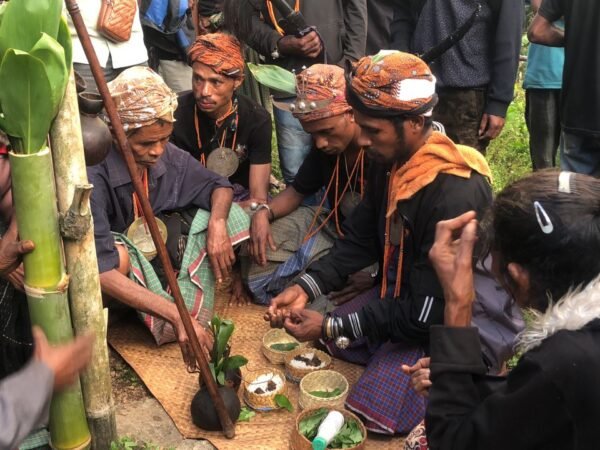Letefoho, November 22, 2024 (Média Democracia) – Related to climate change that is occurring globally, it has resulted in long summers, including in Timor-Leste where the rain does not come on time.
Climate change that has an impact on water drought has made agricultural activities unable to run, therefore the community of Hohulu Hamlet, Lauana Village, Letefoho Post-administration, Ermera Municipality together with the Village Head held a rain summoning ritual.
This rain summoning ritual is carried out by the community with the village head in the Hohulu Bidau hamlet, in the form of a cultural event of dancing and blowing cow horns according to Hohulu culture to visit and take 4 water sources to be taken to Leldu to summon rain.
The spiritual figure of the Hohulu Leldu Traditional Hall, Manuel Colisala, said that this rain summoning ritual was carried out because the long dry season meant that rain did not fall on time, thus impacting the lives of humans, animals and plants.
“The purpose of this culture is to call for rain, when it doesn’t rain then the summer will be long and it will affect our lives. We call for rain so that vegetables, plants grow and give life to animals and humans, because when it doesn’t rain we can’t plant well.” He said
He informed that the places that participated in the traditional ceremony to call the rain were Leldu, Komluli, Dasu, Mau, Libu, Letelu and BIhahi. The places that have insect culture are Goa Leldu which previously had 27 houses in Lauala Village.
“Climate change, because our ancestors taught that when the summer is long we must gather to call for rain, call for rain to give life to everyone, because the rain does not fall then we hold a cultural event to call for rain.” He explained.
He continued, this culture of calling for rain has always existed because the ancestors who passed down this culture continued this ritual by visiting 4 springs.
“There are four springs, namely Soi Laka, Fahi-Luha, Hurtelesu and Binumata which will ask for the first spring not to rain, then continue to the next spring and the last spring must rain, because that is the principle of our ancestral culture that we must not waste it, every year we always hold this.” He continued.
As a representative of the Hohulu sub-village community, Hipolito Soares said that this rain summoning ritual is held every year with the aim of summoning rain with the Lauana Village “dadolin”.
“This cultural process, every year has always happened since the time of our ancestors, when rain fell on the land, and we have four water sources and now the grandparents since yesterday came out of the cultural house and rested in Fahi-luha and called for rain with dadolin.” Hipolito said.
The main objective of this cultural activity is to prevent climate change, because if people do not respect culture, it can result in rain, earthquakes, landslides, even though every year the government allocates large funds but disasters still occur.
“I suggest to the state to pay more attention to our culture, because the main key to this country is culture, therefore the state must pay attention to culture to support something so that we as a society can improve water sources and take preventive measures so that landslides do not occur frequently.” He said
Meanwhile, the rain summoning cultural event is always held every year before the rain falls, and is fully attended by the grandchildren of Hohulu Hamlet and Ainapa Mregi Hamlet and fully supported by the Hohulu youth, local government and security forces.
In addition, journalists obtained this information through their participation in media tours for which AJTL collaborated with OXFAM in Timor-Leste and received financial support from Oxfam Hong Kong.
Reported by : Estefania
Picture by : Estefania

